- Home
- Susanna Kearsley
Season of Storms Page 18
Season of Storms Read online
Page 18
Small wonder both Daniela and Edwina Farrow wanted to stay here. It really was beautiful. Though, as Edwina had said, perhaps rather too large for one person.
I hoped it was large enough to shelter me, as well—the raindrops were falling more steadily now, and the clouds had rolled over dark grey. Tucking my head down, I made a dash for it across the lawn.
I’d nearly reached the palm trees when a hand of stone descended on my shoulder.
I jumped as my heart lurched and lodged in the back of my throat. Wheeling, I saw only a stained denim shirt-front. The wind whipped a blast of rain into my eyes, making me squint as my gaze travelled up to the face of the man who was holding me pinned now by both arms—an ill-tempered face with the jaw of a bulldog. The workman Pietro.
I’d only felt fear, real fear, a few times in my life: once when strange footsteps had followed me home on the street late one night; once when I’d found myself stuck on the tube all alone with a gang of drunken yobs; and now, this instant, with Pietro glaring down at me and no one else in sight.
He asked me a question, short, sharp, and unpleasant.
I pushed back the fear, tried to smile. “I’m sorry, I don’t understand. I—”
Grabbing me harder, he gave me a shake and repeated whatever he’d asked, his voice rising.
“Look, I’m sorry, but—”
“What are you doing?” Edwina’s voice sliced over mine, firm and clear and demanding, from somewhere above both our heads. I looked up to see her leaning from one of the villa’s upstairs windows, her own face nearly as cross as Pietro’s. “Stop it!” she ordered him. “Stop it this instant!”
I doubted whether Pietro actually understood English, but he clearly got the message. And incredibly, he stopped. Letting go my arms, he took a slow step back, uncertainly.
“Now go away,” Edwina said. “Go on,” she told him, “shoo!”
He glowered at the peremptory wave of her hand from the window, and muttered a bit to himself, but he left all the same, turning hard on his heel as Edwina leaned out further, calling down, “Are you all right, my dear?”
I rubbed my bruising arms. “I’m fine, yes. Thank you.”
“Well, come in, child, don’t stand there. Come in.” And with that, like the Queen, she withdrew through the balconied window, and pulled the shutters tight against the weather.
vi
“NASTY day,” Edwina said, and promptly shut the door upon it, handing me a towelling robe—bright pink, with flowers—and steering me into a small bathroom off the entry hall. “Here, take off those wet clothes and put this on, before you catch your death.” As I emerged, she said, “The stupid man. What was he thinking, harassing a guest like that? He didn’t frighten you too much, my dear, I hope? No? Good. Now, give those to me.” She collected my wet clothes. “I’ll just go ring Alex, to tell him you’ll be stopping here with me for lunch.”
Belting the pink robe, I glanced up in protest. “Oh, no, I couldn’t possibly impose . . .”
“It’s not a question of imposing. It’s already a quarter to twelve, and the clothes-dryer won’t work that quickly.” She smiled. “And I don’t think you’d want to sit at table in that outfit, would you?”
Pushing up the sleeves, I shook my head and tucked a strand of dripping hair behind my ear. The small movement caught her attention.
“And I’ll fetch you a towel,” she said, “for your hair. Have a seat.” She was waving one arm at the spacious front room opening off the entry—a bright room, and airy, surprisingly so, considering the darkly claustrophobic decor that Galeazzo D’Ascanio had favoured nearly everywhere else.
“Ah, yes, but this was his wife’s house,” Edwina explained, when she returned. “And my daughter moved in here with Alex’s father, after he’d closed up the main house. She had a hand in the decorating, my daughter did, as I’m sure you’ll be able to tell.”
Indeed the look was almost English Country: flowered chintz and needlepoint and bowls of tulips on the windowsills. Over the mantel a large gilt-framed mirror reflected the room and enlarged it, while in the grate below a modest fire burned to take the chill edge off the air.
I looked round with interest. “So this is the house where Alex grew up, then?”
“And his father before him. Though Alex didn’t spend much time here, really. He was off at school.” She took a step closer to the fire and rubbed her arms. “I’ve never known it to be so cold in April. The weather is very unsettled this year.” Seeing that I’d finished towelling dry my hair and was holding the towel uncertainly, she said, “Just put it over the back of that chair, dear. Daniela isn’t here to make a fuss.”
I did as instructed, feeling relief. “She’s gone out, then?”
“Took off in a temper. I expect that she’s gone to give Alex an earful. Serves him right, mind,” she said. “What he sees in that woman . . .”
“She is very lovely.”
“Mm.” It was an unconvincing syllable. “Now then, what will you have with your sandwiches? Tea? Right, I’ll go put the kettle on. Shan’t be a tick.”
Left alone for the moment, I wandered the room, admiring the artwork that hung on the walls and exploring the bookshelves and the narrow glass curio cabinet. I was bending for a better look at one of the objects in the cabinet when Edwina returned.
“This goblet,” I asked her, and pointed it out, “do you know I saw one very like it in Venice, in St. Mark’s Basilica?”
“The chalice, do you mean? Yes, well, the two of them probably came from the same place,” she said. “Stolen from Constantinople as part of the spoils of the Fourth Crusade. Do you know about the Fourth Crusade?”
Still mindful of Den and Rupert’s lecturing in Venice, I smiled. “Well, actually . . .”
But Edwina, assuming that I wouldn’t know, had already launched into the history of it, and from politeness I let her tell me the story all over again, of how the Venetians had tricked the Crusaders into attacking the Christian city of Constantinople, and how they had stolen away with its treasures.
While she was speaking, I studied the medieval lines of the chalice, the pale clouded bowl that looked like alabaster set within a tracery of gold that had been studded with square gemstones and inscribed with strange words in block letters that might have been Greek. “But how did this come to be here, in this house?”
“That was theft again, theft of a more modern sort,” said Edwina. “During the first war, Galeazzo D’Ascanio took a place in Venice . . .”
“The Casetta Fiorita.”
“Yes, exactly. It properly belonged to some poor Austrian, but war being what it is . . .” She shrugged. “Anyhow, the story goes that the original builder of the Casetta Fiorita was a Crusader, or the son of a Crusader—I never can remember which—who’d kept a few choice souvenirs from the plunder of Constantinople. And through the years these were passed down through the family, the last of whom—a daughter—married the Austrian chap.”
“The one who lost the house in World War I?” I asked, to check I’d got things straight.
“That’s right. He was out of the country, I believe, when the Casetta Fiorita was sequestrated by the government, so all his belongings, the furniture, everything was still in the house when Galeazzo moved in. And naturally, seeing the treasures of Constantinople . . .” She smiled. “He was a great lover of relics, of beautiful things. So when he was told, after the war, that the Austrian was getting the Casetta Fiorita back, he took what he wanted before he moved on. Stripped the library bare, and a room full of tapestries, and helped himself to small things like that chalice.”
“Didn’t the Austrian complain?”
“Very likely. But I doubt anyone would have listened. After all, he’d spent the last years of the war dropping bombs on the Casetta Fiorita himself, out of spite, and Galeazzo made a rather clever defence of that, claiming the bombings had destroyed many things in the house. Besides, the authorities did tend to look the other way, I’m told,
when Galeazzo was involved. He had that kind of charm.”
A whistle sounded in the kitchen as the kettle came to the boil, and excusing herself she went to make the tea, leaving me alone again. This time, as I moved round to settle myself in an armchair pulled close to the fire, I spotted another small object of obvious value: an expensively slimline gold cigarette lighter that lay on the little round table beside me. Daniela’s, I assumed, though I’d thought hers was silver.
Edwina, returning with our sandwiches and tea, shunted lighter and ashtray aside to make room for the tray she was carrying. “We won’t be needing those,” she said. “You’re not a smoker, are you? Good girl. I was, once. It’s a beastly hard habit to break.”
“I was always too afraid it would ruin my voice,” I confessed.
“Yes, I should think you would have to take care, as an actress.” Taking the armchair opposite, she offered me the plate of sandwiches, curious constructions of meat and tomato between rounds of flattened bread. “I can’t guarantee how they’ll taste—I didn’t make them, only bought them at the station in Milan this morning, just in case the girl got hungry on the drive. But she didn’t. She hasn’t got much of an appetite, that one, and I don’t believe that’s the fault of her illness. She’s far too thin, I think. In my day, girls were not encouraged to be skeletons, not like they are today. It isn’t healthy.”
Beneath the accusation of her eyes, I took two sandwiches and sat back. “What is Poppy like?”
“I couldn’t tell you, really. Quiet girl, she barely said two words the whole way down. Well mannered. But not—and this is only my impression, mind—not a very happy child. That might just be her age. I wasn’t filled with joy myself, at twelve. But still, in Poppy’s case, I feel it might be something more,” she said. “Her parents are divorced, I take it?”
Feeling once again that stab of guilt, I answered, “Yes.”
“Well, that might be it. Some children are able to cope, and some aren’t.”
“I believe she was only a baby,” I said, “when her parents split up.”
“But a child still feels the absence of a father.” Luckily, she wasn’t looking at my face when she said that. She’d bent her head to pour the tea. “Milk and sugar?”
“Please.” I looked for something else to talk about, and saw in the adjoining room a small stack of packing crates half-covered by a canvas sheet. “Are they doing restorations down here, as well?”
She followed my gaze. “Oh, no, those are some of the more fragile items brought down from the house, you know, for safety, while the work is going on. This is the one place the workmen won’t be touching.”
“Is this villa not part of the gift to the Trust, then?”
“Oh yes,” she said. “Everything goes. The house, this villa, the gardens, the theatre; everything. Alex will have private use of a few select rooms for his lifetime, but after this summer the whole thing will really belong to the public.”
She sounded disapproving. I studied her over my teacup, remembering what she’d said that morning about being pleased with what Alex had done to the house, though she didn’t think much of his motives.
Exploring this, I said, “It’s very generous, what he’s doing.”
“Yes.” The single word came on a sigh, unexpectedly. “Well, he was always a giving little boy, you know. But I’m afraid giving Il Piacere to the public won’t make the Italians accept him as one of their own.” Her voice, though sympathetic, held the resignation of one who has lived long and seen much and knows how things truly are. “It hasn’t been easy for Alex, you understand, growing up half an Italian, half English—never fully belonging to either culture, always being viewed as foreigner. It hasn’t been easy at all. But this Trust business isn’t the answer.” Decisively, she took another sandwich. “Still, when Alex sets his mind to something, there’s no turning him from it. It was one of his friends, I believe, put him on to the Trust—some chap who’d given them his own villa, to save on the taxes. And once Alex had the idea in his head, well”—she shrugged—“that was that. I did tell him about the warnings I’d been getting, but he wasn’t having any of it.”
“Warnings?”
“Daniela Forlani’s late husband has come to converse with my circle a number of times.”
She said that so naturally, without pause, that at first I wasn’t sure I’d heard her properly. I did a mental double-take. “With your . . . ?”
“Circle,” she repeated. “I’m a Spiritualist, my dear.”
“Oh, I see.” A number of images rose in my mind—of my former flatmate Sally, with her crystals and her tarot cards; of old detective stories in which scatty old ladies in dimly lit drawing rooms huddled round Ouija boards, receiving clues from those who had “passed over”; of mediums speaking in trances at séances . . .
“Have I alarmed you?”
“No, not at all. I was just thinking of our play,” I told her, trying to explain the change in my expression that had been caused, not by alarm, but by inspiration. “Do you know it at all?”
“Very vaguely.”
“Well, part of the first act and almost all of the second is a séance, you see, and Madeleine—she plays the medium—she and I have been having some trouble with our movements, and I wondered . . . that is, since you are a Spiritualist, I wondered if I might ask your opinion?”
Edwina Farrow looked at me a moment, her eyes unsettlingly intense. And then she smiled. Topping up her teacup she leaned back in invitation. “Ask me anything you like.”
vii
“I can’t wait to meet her,” said Nicholas, drily. “She sounds a rare treat.”
“So anyway,” I went on, ignoring him, “Edwina said she’d gladly come and give a demonstration at rehearsal, if we wanted, of what a séance should be like.”
Madeleine, clearly interested, curled her legs beneath her on the crackled leather sofa. We were gathered in the Stanza d’Arazzo—the tapestry room—for drinks before our dinner, it being too cold and too wet on the terrace. This room, though dark and draped with the familiar rich fabrics that D’Ascanio had favoured, nonetheless managed to feel rather cosy. It might have been the warming pools of light cast by the floor lamps with their fringed silk shades, or the presence, in the corner, of a baby grand piano that had obviously been much played, its finish worn and mellowed.
Den had gravitated to the instrument the moment he’d come in, and now was sitting at it trying to assess whether it was in tune by playing arpeggios, with Poppy Hedrick sitting at his side on the piano bench, her thin legs swinging. She still looked deathly pale and, having only just woken from a long afternoon nap, had the groggy, half-sedated look of someone who was ill, but being around Den seemed to make her more cheerful. He’d actually got her to smile, just a moment ago.
I didn’t think she’d been listening at all to what I’d been saying, but she turned now and asked, “What’s a Spiritualist?”
Madeleine answered in the same way she appeared to answer all of Poppy’s questions, with patience and intelligence. “Well, Spiritualism, darling, is an actual organized movement, a kind of religion, whose members believe that people’s bodies die but their spirits don’t, and that these spirits can communicate through mediums—people who are especially sensitive, and who can act as go-betweens at séances. Like the woman I play in Il Prezzo.”
Poppy absorbed this. “And is Mrs. Farrow a medium?”
I was about to reply that she claimed to be, when Nicholas intercepted the question.
In a tone that knew better, he said, “Of course she isn’t.” He rolled his eyes at me. “I hope you didn’t encourage her.”
Madeleine smiled at him. “But darling, think of the fun. A séance! I’d love to see a real medium in action; it would help me with my part.”
“There’s no such thing as a real medium. And there certainly aren’t any spirits.”
Poppy turned to argue. “Yes there are. Mummy saw a ghost once, didn’t you, Mummy?”
“There are too ghosts,” said Poppy in a stubborn tone, to Nicholas. She clearly didn’t like him much. I couldn’t say I blamed her, though it must have made things difficult for Madeleine.
Rupert, who’d been following the conversation from the corner where he’d quietly been studying the contents of the room’s only bookcase, said, “It’s very kind of Alex’s grandmother to offer. Shall we have her come tomorrow?”
“You’re not serious?” asked Nicholas.
“I don’t see any harm in it,” said Rupert. “I’m sure if we were playing this in London, Dennis and I would have thought about bringing in a medium to demonstrate séance technique for you. Wouldn’t we, Dennis?”
“Mm? Oh, yeah, sure,” came the absent reply from the piano corner.
Nicholas exhaled sharply in impatience. “She’s not a medium, she’s only a dotty old woman.”
“Not so dotty,” Den warned him, his smile showing briefly in profile. “Old she may be, but she’s sharp enough to kill a man at fifty paces, take my word.”
“Madness,” said Nicholas under his breath as he shook a cigarette loose from its packet and struck a match to light it. I frowned as I watched him, not because of what he’d said but because of the match—he’d never used matches before, at least not around me. He usually used his lighter . . .
And then all of a sudden my memory kicked in and I knew where he’d left his gold lighter. I’d seen it today, as a matter of fact—on a table by an armchair at the Villa delle Tempeste.
Edwina hadn’t mentioned him, which meant he must have been to see Daniela. The rat, I thought. I looked away, disgusted, and discovered I was being watched. Across the room young Poppy Hedrick glanced from me to Nicholas and back again, and sensing that she’d found a kindred spirit, shyly smiled.

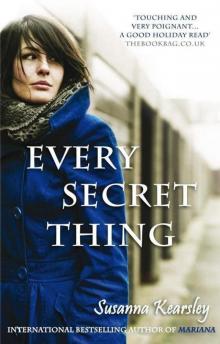 Every Secret Thing
Every Secret Thing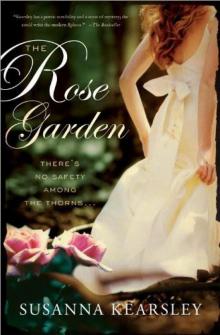 The Rose Garden
The Rose Garden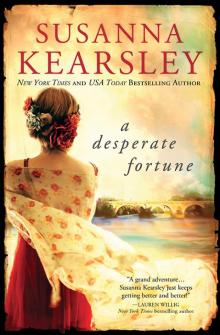 A Desperate Fortune
A Desperate Fortune The Winter Sea
The Winter Sea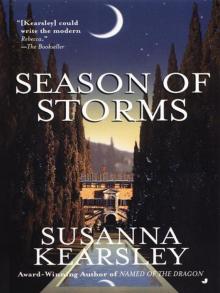 Season of Storms
Season of Storms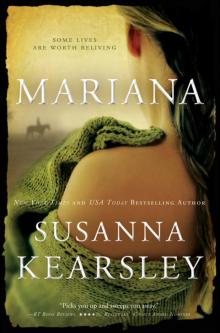 Mariana
Mariana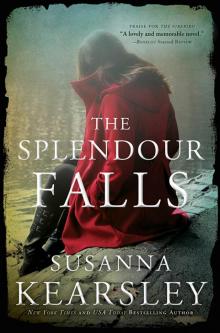 The Splendour Falls
The Splendour Falls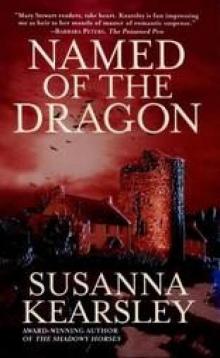 Named of the Dragon
Named of the Dragon Sophia's Secret
Sophia's Secret The Shadowy Horses
The Shadowy Horses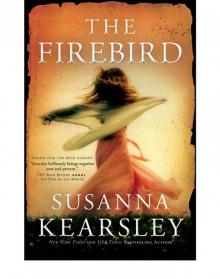 The Firebird
The Firebird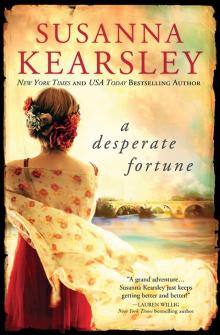 Desperate Fortune
Desperate Fortune